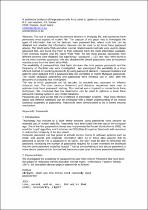 ResearchSpace
ResearchSpace
Statistical analysis of large passwords lists, used to optimize brute force attacks
JavaScript is disabled for your browser. Some features of this site may not work without it.
- ResearchSpace
- →
- Research Publications/Outputs
- →
- Conference Publications
- →
- View Item
| dc.contributor.author |
Van Heerden, Renier P

|
|
| dc.contributor.author |
Vorster, JS

|
|
| dc.date.accessioned | 2009-04-20T13:55:28Z | |
| dc.date.available | 2009-04-20T13:55:28Z | |
| dc.date.issued | 2009-03 | |
| dc.identifier.citation | Van Heerden, RP and Vorster, JS. Statistical analysis of large passwords lists, used to optimize brute force attacks. 4th International Conference on Information Warfare and Security. Cape Town, South Africa; 26-27 March 2009, pp 16 | en |
| dc.identifier.isbn | 978-1-906638-28-3 | |
| dc.identifier.uri | http://hdl.handle.net/10204/3328 | |
| dc.description | 4th International Conference on Information Warfare and Security. Cape Town, South Africa, 26-27 March 2009 | en |
| dc.description.abstract | The use of passwords has become endemic in everyday life, and passwords have penetrated most aspects of modern life. The purpose of this paper was to investigate the types of information that can be deduced from password lists, where such lists can be obtained and whether the information obtained can be used to aid brute force password attacks. The World Wide Web and other Internet related search methods were used to obtain password lists. Researchers found that Peer to Peer networks have the most information available. From previous studies and the World Wide Web, the ten most popular passwords from different systems were obtained. Not surprisingly, “password” , “123” and “abc” were found to be the most common passwords. Researchers also obtained the default passwords used by hardware manufacturers from the World Wide Web | en |
| dc.language.iso | en | en |
| dc.subject | Passwords | en |
| dc.subject | Brute force attacks | en |
| dc.subject | World Wide Web | en |
| dc.subject | Passwords cracking system | en |
| dc.subject | Password list | en |
| dc.subject | Networks | en |
| dc.subject | Information Warfare and Security | en |
| dc.title | Statistical analysis of large passwords lists, used to optimize brute force attacks | en |
| dc.type | Conference Presentation | en |
| dc.identifier.apacitation | Van Heerden, R. P., & Vorster, J. (2009). Statistical analysis of large passwords lists, used to optimize brute force attacks. http://hdl.handle.net/10204/3328 | en_ZA |
| dc.identifier.chicagocitation | Van Heerden, Renier P, and JS Vorster. "Statistical analysis of large passwords lists, used to optimize brute force attacks." (2009): http://hdl.handle.net/10204/3328 | en_ZA |
| dc.identifier.vancouvercitation | Van Heerden RP, Vorster J, Statistical analysis of large passwords lists, used to optimize brute force attacks; 2009. http://hdl.handle.net/10204/3328 . | en_ZA |
| dc.identifier.ris | TY - Conference Presentation AU - Van Heerden, Renier P AU - Vorster, JS AB - The use of passwords has become endemic in everyday life, and passwords have penetrated most aspects of modern life. The purpose of this paper was to investigate the types of information that can be deduced from password lists, where such lists can be obtained and whether the information obtained can be used to aid brute force password attacks. The World Wide Web and other Internet related search methods were used to obtain password lists. Researchers found that Peer to Peer networks have the most information available. From previous studies and the World Wide Web, the ten most popular passwords from different systems were obtained. Not surprisingly, “password” , “123” and “abc” were found to be the most common passwords. Researchers also obtained the default passwords used by hardware manufacturers from the World Wide Web DA - 2009-03 DB - ResearchSpace DP - CSIR KW - Passwords KW - Brute force attacks KW - World Wide Web KW - Passwords cracking system KW - Password list KW - Networks KW - Information Warfare and Security LK - https://researchspace.csir.co.za PY - 2009 SM - 978-1-906638-28-3 T1 - Statistical analysis of large passwords lists, used to optimize brute force attacks TI - Statistical analysis of large passwords lists, used to optimize brute force attacks UR - http://hdl.handle.net/10204/3328 ER - | en_ZA |





